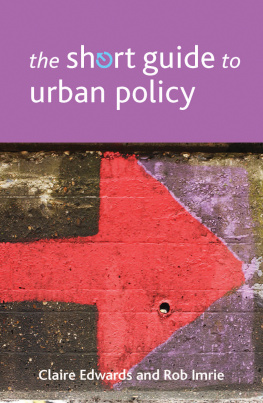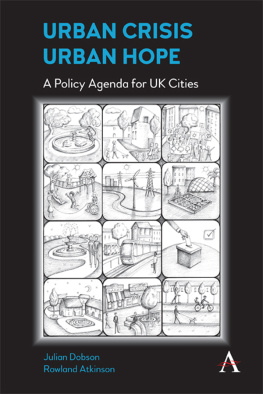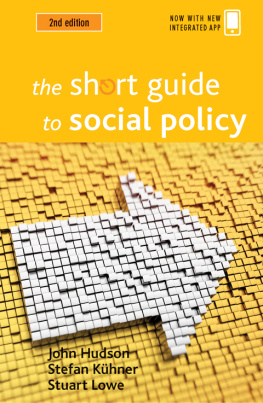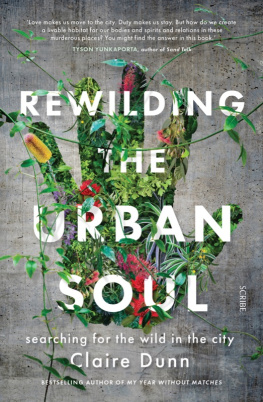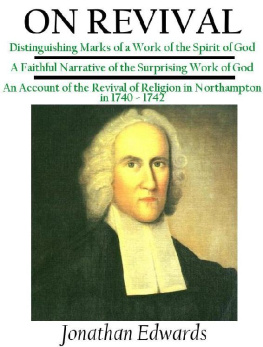
First published in Great Britain in 2015 by
Policy Press
University of Bristol
1-9 Old Park Hill
Bristol BS2 8BB
UK
t: +44 (0)117 954 5940
North American office:
Policy Press
c/o The University of Chicago Press
1427 East 60th Street
Chicago, IL 60637, USA
t: +1 773 702 7700
f: +1 773-702-9756
Policy Press 2015
British Library Cataloguing in Publication Data
A catalogue record for this book is available from the British Library.
Library of Congress Cataloging-in-Publication Data
A catalog record for this book has been requested.
ISBN 978-1-4473-0800-3 ePub
ISBN 978-1-4473-1247-5 Kindle
The right of Claire Edwards and Rob Imrie to be identified as authors of this work has been asserted by them in accordance with the Copyright, Designs and Patents Act 1988.
Every reasonable effort has been made to obtain permission to reproduce copyrighted material. If, however, anyone knows of an oversight, please contact the publisher.
All rights reserved: no part of this publication may be reproduced, stored in a retrieval system, or transmitted in any form or by any means, electronic, mechanical, photocopying, recording, or otherwise without the prior permission of Policy Press.
The statements and opinions contained within this publication are solely those of the authors and not of the University of Bristol or Policy Press. The University of Bristol and Policy Press disclaim responsibility for any injury to persons or property resulting from any material published in this publication.
Policy Press works to counter discrimination on grounds of gender, race, disability, age and sexuality.
Cover design by Policy Press.
Front cover image kindly supplied by www.alamy.com
Readers Guide
This book has been optimised for PDA.
Tables may have been presented to accommodate this devices limitations.
Image presentation is limited by this devices limitations.
Contents
We are indebted to Dr Sarah Fielder who copy-edited a draft of the book and compiled the references and index. Without her help, the book would have taken a lot longer to complete. We are grateful to Emily Watt, Laura Vickers, Jo Morton and Rebecca Tomlinson at Policy Press for their guidance and advice in the preparation and delivery of the book.
Claire Edwards is a lecturer in the School of Applied Social Studies, University College Cork, Ireland. Her background is in urban and cultural geography and social policy. Her research interests include: urban regeneration and the effectiveness of urban policy, particularly in terms of its ability to provide benefit for excluded communities; the participation of disabled people in society and the disability rights agenda; and the politics of social research and the relationship between research and policy. She has published widely in urban geography, social policy and environmental planning, including many peer-reviewed journal papers.
Rob Imrie is Professor of Sociology in the Department of Sociology at Goldsmiths University of London, UK. His research interests include disability and design, urban regeneration, and urban policy and politics. He is author and co-author of several books, including Disability and the city (1996, Paul Chapman Publishing), Inclusive design (2001, Routledge), Accessible housing (2006, Routledge) and Architectural design and regulation (2011, Wiley-Blackwell). At present, he is directing a project funded by the European Research Council on the topic of universal design, disability and the designed environment.
The objective of this book is to provide an overview of urban policy, or purposive interventions by government and non-governmental actors seeking to respond to a broad range of social, welfare, economic and ecological problems related to urbanisation. Urbanisation is fast becoming the dominant way of life for most people in the world, and many urban areas, particularly in countries of the global South, feature rapidly growing populations and greater demands for jobs, housing and basic services, and are spreading, rapidly, into fragile ecosystems. The urban challenges of the 21st century appear daunting and they range widely, from the deleterious ecological and environmental effects of urbanisation, including degraded landscapes, traffic congestion and air and water pollution, to problems of poverty and inequality, and responding to peoples needs for access to good-quality jobs, housing, transport, education and other urban goods and services.
These manifold problems associated with urbanisation have given rise to urban policy, or systems of governance orchestrated by central and local government and a range of non-governmental, usually private sector, organisations and community groups. There are few cities without formal urban policy programmes, and their purported primary target is to enhance citizens welfare by encouraging local economic development and job creation and providing people with the opportunities for access to the necessary means of life, such as good-quality housing. The broad remit of urban policy means that it is a difficult term to define, and, for Cochrane (2007, p 136), it comprises an overlapping patchwork without any clear or consistent overall unified agenda. For some, there is little to differentiate urban policy from social and welfare policy, insofar that the objectives of both are to change peoples lives through state intervention and social and economic support (Atkinson and Moon, 1994; Cochrane, 2007).
What appears to distinguish urban policy from other policy fields is its spatial or geographical focus on the city and, more specifically, on particular parts of cities characterised by government as problem places. Such places tend to be defined as locales with high numbers of people living in poverty and in conditions of relative need. They are, in government language, points of multiple deprivation in which people lack some of the basic means of livelihood, including jobs, a living wage and good-quality, affordable housing. Modern urban policy, in most Western developed countries, was primarily founded on seeking to solve the problems of people living in poor neighbourhoods, with the understanding that poverty was unjust and an affront to a civilised society. For instance, in 1964, US President Lyndon Johnson declared an unconditional war on poverty and racial injustice, and for the next decade, US urban policy focused on self-help programmes related to education, job training and community development.
Similar policy trends were evident in the UK and other Western countries, most notably, in the British context, a plethora of area initiatives, ranging from housing action areas to educational priority areas (see Atkinson and Moon, 1994; Cochrane, 2007). Later, from the early 1980s, the spatial focus for policy shifted towards urban regeneration and the encouragement of inward investment in stricken places, or areas previously abandoned by capital flight. Here, the solution to poverty and deprivation was identified as less about the provision of welfare and social support, and more about economic development and encouraging people to gain the education and skills most marketable to employers. Typical of the time was the London docklands regeneration, a model of property-led urban policy that has since come to dominate government approaches to the social and economic problems of cities (see Imrie and Thomas, 1999; Brownill, 2013).


